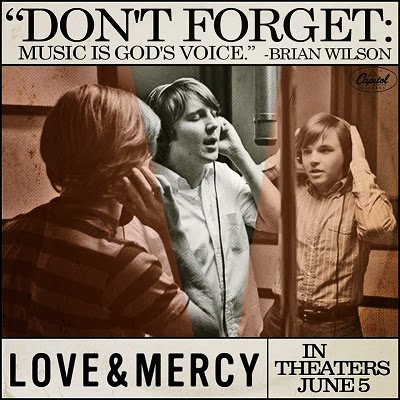
Beach Boys, Love and Mercy Movie and the Lost Gospel of Brian Wilson
Released to DVD and Amazon Prime on September 15th
Most of us associate the Beach Boys with summer-soundtrack songs about surfing, cars and girls on the beach. And their staggering 100,000,000 records sold.
Back in the 60’s, outside the music business, we didn't realize that Brian Wilson, the creative genius who wrote most of their music, was taking his place among American greats like George Gershwin, Rodgers and Hammerstein and Burt Bacharach.
We just knew that when we pulled the sun roof back and crooned along on "Don’t Worry Baby," something deeper reeled us in: the sheer beauty and increasing complexity of the music. The constant shifting from major to minor chords that somehow captured our exuberance in the major theme of life's joys and our longing for love and mercy in a fallen, minor-themed world.
The movie Love and Mercy chronicles the story of Brian Wilson in two narrative arcs. Paul Dano plays twenty-something Brian in the 60’s at the height of his creative genius.
John Cusack plays Wilson in the 80’s—a damaged soul who slips a beautiful Cadillac saleswoman a note with three hastily written words: lonely, frightened, scared. The movie seamlessly weaves together scenes from both periods to show how Brian fell into the minor theme and couldn’t find his way out. Yet it leaves the larger story of why unexplored.
Life with Father
After a montage of the Beach Boys meteoric rise in the early 60's the movie introduces us to the tensions building in Brian's life, beginning with his Dad. The “Beach Boys” was a family business. Together with his two younger brothers, Dennis and Carl, his cousin Mike Love, and his good friend Al Jardine, Brian quickly realizes the success that had always eluded his middling music-biz father.
Picture Amadeus Mozart being managed and produced by the green-eyed Salieri. With some major differences: Brian, a true prodigy, is a genuinely nice guy. Funny, kind, energetic. Child-like in his wonder and joy of creating and singing. And desperate to learn and grow.
Murray Wilson was an abusive father—physically, emotionally and verbally. But he knew the business. So the group submitted to his leadership until Brian finally had enough of his finger-in-his-chest, you-will-never-amount-to-anything-without-me harangues and, at age 22, fired him and took over.
But you cannot fire your Dad from being your Dad. The continued conflict plus the pressure of producing three albums a year, plus touring, plus producing for other bands, plus his own inner drive to innovate with excellence eventually induces a full-out panic attack. On a flight home from a concert Brian, then 24, comes unglued. He quits touring to work on writing and recording music tracks for their next album, Pet Sounds.
A move to the minor theme
One of the film’s finest accomplishments is to take us inside Brian’s head and and show us what he hears there and how he gets it laid down on tape. His artistic vision begins to grow beyond surf, sand and cars. He has found stress relief (and good times) taking drugs, which naturally focus your thoughts on your interior world.
Some have called Pet Sounds the soundtrack of Brian's life. What unifies the album is not its subject matter, but its more introspective, minor-theme and mood expressed in songs of alienation (“I Just Wasn’t Made for These Times”) and much more vulnerability about the challenges to love well and faithfully (“God Only Knows,” “Caroline, No.”)
To film these scenes Bill Pohlad decided to bring in real studio musicians, not actors and dress them in 60’s costumes. We watch Brian/Dano mesmerize the Juliard-trained pros with his ability to create never-before-heard combinations of sounds and rhythms.
In its day Pet Sounds was as revolutionary as the Beatles’ Sargent Pepper’s Lonely Hearts Club Band. In fact, it inspired Paul and John to produce Sargent Peppers’. One of the best parts about this BBC documentary on Pet Sounds comes at 35:45 where Andrew Oldham (Rolling Stones manager), Eric Clapton (Cream), and Graham Nash (Crosby, Stills and Nash) rave about how Pet Sounds profoundly challenged them to rethink how they would write music back in that golden age of rock.
Other musicians may have been in awe, but Mike Love was not. The Beach Boys had a good thing going and Love wants to repeat the formula. He doesn’t resonate with Brian’s creative reach to the next level. It was great music. But it wasn’t the “Beach Boys.” “All these songs are sad,” he protested. His reservations about connecting with their fans were somewhat confirmed when the album only sold 500,000 copies as compared to their usual million sellers.
On the liner notes to a re-release of Pet Sounds Brian's then wife Marilyn wrote, “When Pet Sounds wasn't an immediate success, it really destroyed Brian. He just lost a lot of faith in people and music. Because he put his heart and soul into it, it's hard to think that people just want something mediocre instead of that wonderful, wonderful album. But let's face it, he was just ahead of his time. People weren't ready for it. How could they be? How can you go from 'Barbara Ann' to those songs?
“If Pet Sounds was Brian letting go of his own soul and it wasn't a big hit, then when people would talk about it later, tell him how great it was, even if it was just a year later, he didn't want to hear about it. It reminded him of failing. And then he was more tortured.
"Who knows what would have happened if that album had been a hit, 'cause that was not his limit. At the time, he was dying inside to express himself. It was his goal. More than that, he had to do it. It was so intense. He probably thought that all that was going to give him the satisfaction he needed out of life. It wasn't the answer to his problems.”
Neither were the drugs he was taking. Marijuana. Hashish. Benzedrine. Cocaine. LSD.
The main thing that Love and Mercy missed
Love and Mercy sensitively portrays Brian’s complicated decline in the latter 60’s. But there’s a hole at the center. It fails to explore the deeper spiritual motivation.
Coping with stress, enjoying the highs and seeking enhanced creativity for his music were not the only reasons Brian turned to drugs. In Good Bye Surfing Hello God, a piece written for The Saturday Evening Post (turned down by his editor and published in Cheetah), Jules Siegel narrates how Brian was embracing drugs and music as a path to spirituality.
While the Beatles descent into drugs and Eastern mysticism is fairly well known, Brian's journey in the same direction is less so. In the documentary Beautiful Dreamer: Brian Wilson and the Story of Smile he says, "I always wanted to learn about life, meta-physics, spirituality, philosophy." He believed he was in touch with the cosmos.
The gospel according to the 60’s drug culture and Eastern mysticism differed radically from the gospel of Jesus. It rejected the cornerstone–that we can be restored from the spiritual death of our selfishness and woundedness to a new life. We can enjoy an intimate relationship with a personal, loving God by receiving forgiveness through Jesus, who sacrificed his life for our sin, in our place.
It also rejected God’s word as truth and encouraged young people to seek truth in your own head. Escape from reason and reality and embrace mystery–the mystery that all is one. Turn on to the god within. LSD in particular would shatter your ego and you would experience a new spiritual birth. The experience would open the doors to Paradise.
Rather than a relationship, spirituality became a physical experience: meditation, or a drug/music-induced trip. Harvard psychologist Timothy Leary preached the new gospel: drugs were the sacraments of a new religion. “You’re turned on to the incredible wisdom that lies in every cell in your body.”
If enough people tripped out and became enlightened it would solve all the problems of civilization. Drugs and rock music would take us to "total freedom, total experience, total love, peace and mutual affection."
LSD: The rest of the story
Love and Mercy makes it look like Brian was casually offered LSD at a party. In Beautiful Dreamer, Lorren Daro, Brian’s friend says, “I got him at my house one night and gave him 125 mics of purple liquid Owsley. Brian got higher and higher and higher,” Daro laughs gleefully, “I believe that that trip changed everything in Brian’s life. It did not make him crazy. And he began to write all the best songs of his career.”
In an online clarification, apparently Daro makes the case that, “Brian came to me and literally begged me to give him LSD.” He says he didn’t at first, but finally gave in.
Brian told Los Angeles writer Tom Nolan in 1966, “About a year ago I had what I consider a religious experience. I took LSD, a full dose of LSD, and another time I took a smaller dose. I learned a lot of things, like patience, understanding. I can’t teach you or tell you what I learned from taking it, but I consider it a very religious experience. ”
In the movie he confides to his wife that the drug expanded his mind, but also terrified him. In interviews he described his feelings on his first trip: “I’m afraid of my mom. I’m afraid of my dad. Because it heightens your awareness.” About a week after he took LSD he started to hear voices that continually said, “We’re going to kill you. We’re going to kill you.”
Brian would battle the voices for the rest of his life.
Brian's lost gospel
Drugs also profoundly affected Brian’s next creative efforts, the smash hit single “Good Vibrations” and the legendary album Smile. Psychedelic trips enhance your experience of sounds and colors. Brian tried to capture those colors of sound in his music composition. One of the best scenes in the movie recreates this recording:
"Good Vibrations" was originally conceived as a track on the next album, Smile, an album that would have propelled The Beach Boys beyond the Beatles and Sergeant Peppers. Lyrically, like the Beatles, the words were becoming detached from meaning, relying for effect on the sounds and tonal colors of enigmatic word images: “A blind class aristocracy, Back through the opera glass you see, The pit and the pendulum drawn, Columnated ruins domino.” Listening to "Surf's Up" you can hear the connections to "Caroline, No," pushing the musical intervals and imagery much further, and light years away from "I Get Around."
Famous 60's conductor Leonard Bernstein featured Brian in a CBS documentary that showcased America's newest important musical voices. A film crew came out to LA and filmed Brian singing the very UN-Beach Boy song. (read lyrics here; view the video here on youTube)
Explaining the enigmatic lyrics of the song to Jules Siegel, Brian said, “I heard the word—of God; Wonderful thing—the joy of enlightenment, of seeing God. And what is it? A children’s song! And then there’s the song itself; the song of children; the song of the universe rising and falling in wave after wave, the song of God, hiding his love from us, but always letting us find him again, like a mother singing to her children.”
“I’m doing the spiritual sound, a white spiritual sound.” Brian told Siegel. “Religious music. Did you hear the Beatle’s album? Religious, right? That’s the whole movement. It’s going to scare a lot of people when I get there.”
But as it turned out, Brian was the one getting scared.
How do you respond to the Beach Boys' music? To Brian's "gospel"? Comment below…
Lael Arrington
Faith and Culture: Live Wisely. Love Well.
www.laelarrington.com



